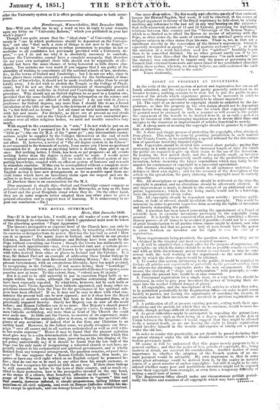Farnborough, Warwickshire, 30th December 1860. Sea—Will you allow me to
say a word or two in reply to your remarks upon my letter on "University B.eform," which you published in.your last week's paper.?
Though I am quite aware that the " ideal state " of University arrange- ments 18 "one m which professions should be dependent on the Universi- ties " and also "that such a state of things is not now to be found,"— -Oil* it would be "outrageous -to refuse permission to practise in law or medicine to all candidates -not previously provided with a University de- gree," — yet I do not see why it is absolutely necessary to conclude, because the Universities cannot have a complete monopoly, that therefore (to use your own metaphor) their bills should not be negotiable at all— should not have the same chance of being honoured as bills drawn else- where. You mistake me very much if you suppose that I am guilty of the absurdity of wishing to concentrate all the national schools of law, medicine, est., in the towns of Oxford and Cambridge; but I do not see why, since in those places there exists ostensibly a machinery for the furtherance of thoss branches of knowledge, it should not be made available rather than be swept totally away. I do not wish to abolish the Temple or the College of Physi- cians; but I do not see that the re5stablishment of thoroughly practical schools of law and medicine in Oxford and Cambridge necessitates such a procedure. Why should not an Oxford diploma be as food as a London one, provided that the same facilities of obtaining information on the science and practice of medicine are offered at both places? I do not wish to force a preference for Oxford degrees, any more than I should like to see a forced circulation of the bills of one bank to the detriment of all thereat. Let there be "a fair field and no favour." Let all stand on their intrinsic merits. So with law and music. For divinity, as there are at present no real rivals to the Universities, and as the Church of England has now undoubted pre- cedence over all other religious bodies, we need not trouble ourselves very much.
With regard to the examinations in "arts," I do not wish to put on an extra one. The one I proposed for B.A. would take the place of the present "little go "—the one for MA. of the "great go" ; any intermediate exami- nations might be supplied by the Colleges themselves at the end of each term. I mean something more than what is, in most cases, a merely nomi- nal affair. If, however, a revival of " the old degree system in its fulness" is not congenial to thedemands of society, I can assure you I have no profound veneration for it. As soon as anything better is devised, then give it up at once. But nothing better, I think, has been as yet proposed—at all events nothing better than the degree system might be made. I would never wrangle about names and details. All we want is an efficient system of im- parting knowledge, coupled with an efficient system of honours and rewards to stimulate exertion. If this can be accomplished without a complete over- throw of existing institutiona, it is more in accordance with the spirit of the English nation to base new arrangements as far as Feasible upon those an- cient forms which have an hereditary claim upon our respect and are fa- miliar to us from our earliest recollections. J. OATES. At Durham there is an examination for the M.A.
[Our argument is simply this—Oxford and Cambridge cannot compare as practical schools of law or medicine with the Metropolis, so long as the inns of Court and the great Hospitals stand where they do. On the other hand, they are in some respects better adapted than any other place to give a general education and to support men of learning. It is unnecessary to re- peat our conclusiou.—En.]






























 Previous page
Previous page